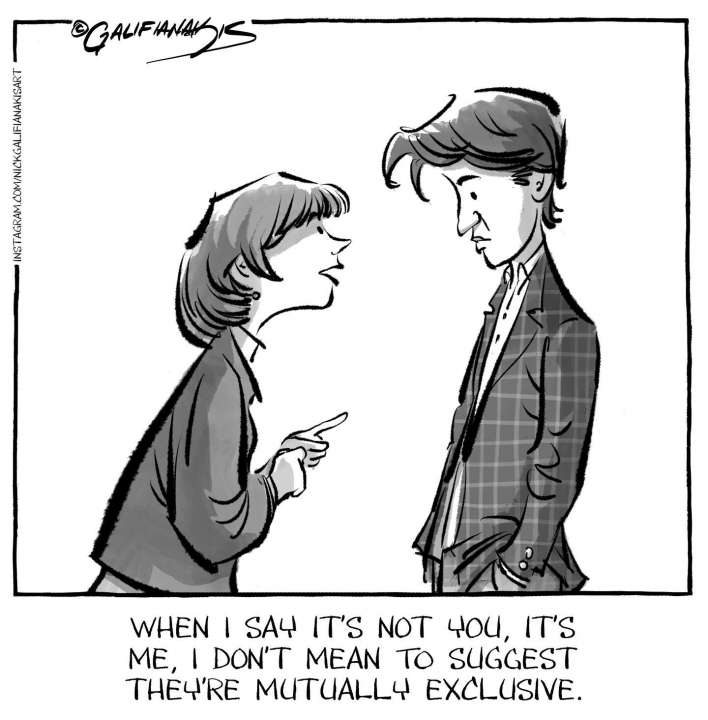Dear Carolyn: When I met “Susan” I was a 25-year-old virgin, and she was 30 and just out of a five-year marriage to a pathologically jealous guy who had battered her. To give you an idea, he once beat the crap out of one of her platonic friends, thinking the other man posed a threat. He had also accused her of having sex with the dog.
Carolyn Hax: ‘It’s not you,’ she said — then committed to someone else

We began dating, and soon she was doing a great imitation of a woman who was in love with me — all over me constantly, telling me how wonderful I was. One night I took her home, she asked me to spend the night, and we made love. The fact that I was a virgin was pretty evident, and I saw no point in denying it.
A few days later I told her I was in love with her and wanted a relationship. I got the, “It’s not you, it’s me,” spiel: “I need time and space. I made a mistake marrying my husband, and I don’t want to make another mistake.” At one point I said, “Tell it to me straight.” I asked her if I was at least in the running, and she said yes. She was willing to keep seeing me, which was less than I wanted, but I figured I’d take what I could get. She didn’t ask me to spend the night again.
Five weeks later she said she’d entered an exclusive relationship with another man. I was shattered. So much for needing time and space.
Apparently, it wasn’t her after all, it was me. If it had taken several months for this to happen, I would have said, “Okay, she wasn’t ready for a relationship then, but she is now, and I wasn’t the one, so be it.” But five weeks?
I suppose that given her recent history, she wasn’t a great prospect for a relationship, but I think she was extremely dishonest. When I told her I loved her, she should have said, “I don’t love you back, and I can’t see you anymore.” What do you think?
— Apparently, It Was Me
Apparently, It Was Me: I think her, “It’s not you, it’s me,” was the one moment of clarity Susan had in the entire span you describe.
Not that everything that happened was about her. But I’ll get to that in a second.
The woman you described is reeling. Emotionally all over the place. I’d be reeling, too, if I were newly rid of a spouse who beat me — someone who felt so entitled to possess me that he beat the snot out of my friend just for being my friend.
You acknowledge that yourself: Susan was “not a great prospect.” But then you accuse her of lying to you, and you write a preferred breakup script that only someone with a healthy EQ could have pulled off.
Again, putting myself in her place, I hope I’d be able to recognize I was off-balance and needed a cease-romance till I steadied myself a bit; tell you the love/physical connection wasn’t there as I broke up with you; and block off whatever “me” time it took to work through my trauma — but that’s the thing about reeling from a trauma or anything else. It compromises judgment. Which requires good judgment to fix.
It is a complex problem that a simple “should have” can’t reach.
Plus, to be thorough: “Shoulds” mean expectations, templates, control. The letdowns and finger-pointing.
You get your needs met or you don’t. You stay or you don’t. No “should.”
All together, this suggests you’re taking the wrong message from the breakup. You see it as, “She didn’t love me but then loved someone else so the problem was obviously with me and she lied and just pretended to love me.” No. Well, maybe, but more likely: She is a traumatized person, possibly seeking pain relief in new attractions, and you had preconceived expectations of love that she couldn’t meet.
Compassion both for Susan and for yourself would be more apt here, and rewarding, than picking through the wreckage for blame. Compassion and understanding: “Given her recent history, she wasn’t a great prospect for a relationship” is not an “I suppose” kind of thing. It’s huge.
My answer is kind of reeling here, too — so much to cover — but I’ll wrap it up this way:
Breakups happen all the time, every day, constantly, always. People get together for reasons and break up for reasons and there’s nothing “wrong” with any of the reasons. It’s a necessary sorting process and it’s arguably not even personal. If a shirt doesn’t fit, is it your fault? The shirt’s?
Susan didn’t fit. When the pain of that eases, you can be a bitter person seeking phantom justice, or wiser person seeking a better fit. Entirely your choice to make.






